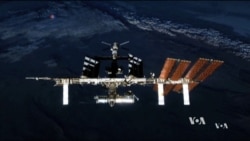Forty-five years ago this month, the first humans walked on the moon. It was during an era of the space race between the United States and the Soviet Union. World politics have changed since then and so has the nature of space exploration.
More than four decades ago, American astronauts Neil Armstrong and Buzz Aldrin became the first humans to step onto the moon. With the planting of an American flag on the lunar surface, the United States claimed the lead in space exploration. No longer, said Aldrin.
“We’re in not very good shape. We can’t even take our people to our space station that cost the United States $100 billion,” he said.
Aldrin said lunar exploration needs to continue in order to take the next giant step to Mars... adding, that will take cooperation with other countries that have joined the space-faring community.
“We need to lead at the moon. The only way we can lead at the moon is to cooperate with the Chinese and not compete with anybody, but help them as best we can. Every way we help will be a stepping stone for us to get to Mars,” said Aldrin.
Mars is goal
Mars is the goal for the U.S. space agency, but in a Skype interview, NASA’s Ellen Stofan said getting there will take time.
“Getting to Mars is really hard and it’s not just because it’s really far away, it takes about eight months to get there. It’s because we don’t have the technology right now to allow us to do it,” said Stofan.
She said in order to get to Mars, the U.S. has to work with other countries
“Most missions we do, whether they are planetary or astrophysics, we do it with international partners. It’s really the way we do business now," she said.
And those partners are not just foreign governments. They include private companies that will be taking astronauts to the space station from U.S. soil in 2017. Companies, including Virgin Galactic, are also catering to scientists as well as space tourists. Virgin's William Pomerantz said they aim to send their first customers into space sometime this year.
“Our ability is to take you up into outer space itself give you the view out the window and give your experiments several minutes of really high quality micro gravity. So you’re now seeing this new generation of entrepreneurs, many of whom grew up watching those Apollo missions, who are now taking those technologies first developed by NASA and they’re further developing them."
Space tourism
Space engineer John Spencer, the founder of the Space Tourism Society, expects space tourism to become a big industry.
“The next decade will really be the breakthrough decade with hundreds of companies involved in space experiences, tourism return to the moon for tourism experiences. Exploration for Mars is starting,” said Spencer.
Space exploration also seems to still have the ability to inspire young people, including teens Reese Hartwig and Ella Wahlestedt, who had a chance to meet Aldrin.
“I think that would be cool to see Mars and cool to go,” said Hartwig.
“The Universe is so vast, so big, there’s got to be something more out there,” said Wahlestedt.
NASA also is asking - and hoping to answer - that question: Are we alone in the universe?





